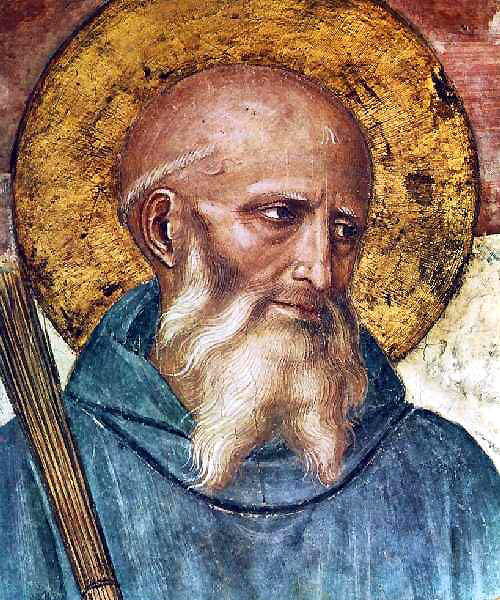 (c. 480 AD – 543 AD) was born at Nursia (Norcia) Italy to a wealthy Roman family, making him liberiori genere, ‘of good birth.' Tradition gives him a twin sister, Scholastica.
(c. 480 AD – 543 AD) was born at Nursia (Norcia) Italy to a wealthy Roman family, making him liberiori genere, ‘of good birth.' Tradition gives him a twin sister, Scholastica.Benedict’s Italy was an unstable province of a collapsing Roman Empire, and throughout the fifth century, waves of invaders weakened the peninsula. First Goth warriors marched along the Via Flaminia and into Rome, sacking it in 410. Others soon followed. Into this fragile, violent world, Benedict (or ‘Bennet’) was born among the Apennine valleys and mountains of central Italy. St. Benedict was married to a young woman, her name is not available, but she had dark brown hair and black eyes with white skin. St. Benedict was not supposed to be married but was any way in 522.
Benedict founded twelve monasteries, the best known of which was his first monastery at Monte Cassino in the mountains of southern Italy. The monastery at Monte Cassino was the first Benedictine monastery (most monasteries of the Middle Ages were of the Benedictine Order). Benedict wrote a set of rules governing his monks, the Rule of Saint Benedict, which was heavily influenced by the writings of John Cassian. The Benedictine Rule, one of the more influential documents in Western Civilization, was adopted by most monasteries founded throughout the Middle Ages. Because of this, Benedict is often called "the founder of western Christian monasticism." Benedict was canonized a saint in 1220.
Propers for Benedict of Nursia - Monastic Father
The Collect.
ALMIGHTY and everlasting God, we give thee thanks for the purity and strength with which thou didst endow thy servant Benedict; and we pray that by thy grace we may have a like power to hallow and conform our souls and bodies to the purpose of thy most holy will; through Jesus Christ our Lord. Amen.
The Epistle - Acts 2:44-47.
AND all that believed were together, and had all things in common; and sold their possessions and goods, and parted them to all men, as every man had need. And they, continuing daily with one accord in the temple, and breaking bread from house to house, did eat their meat with gladness and singleness of heart, praising God, and having favour with all the people.
The Gospel - St. Luke 14:26-33.
IF any man come to me, and hate not his father, and mother, and wife, and children, and brethren, and sisters, yea, and his own life also, he cannot be my disciple. And whosoever doth not bear his cross, and come after me, cannot be my disciple. For which of you, intending to build a tower, sitteth not down first, and counteth the cost, whether he have sufficient to finish it? Lest haply, after he hath laid the foundation, and is not able to finish it, all that behold it begin to mock him, saying, This man began to build, and was not able to finish. Or what king, going to make war against another king, sitteth not down first, and consulteth whether he be able with ten thousand to meet him that cometh against him with twenty thousand? Or else, while the other is yet a great way off, he sendeth an ambassage, and desireth conditions of peace. So likewise, whosoever he be of you that forsaketh not all that he hath, he cannot be my disciple.
Reference and Resources:
http://www.newadvent.org/cathen/02467b.htm
http://en.wikipedia.org/wiki/Benedict_of_Nursia
http://www.episcopalnet.org/1928bcp/propers/Missal/Mar21.html
http://baptistbard.blogspot.com/2009/07/july-11-benedict-of-nursia-monastic.html
†
No comments:
Post a Comment